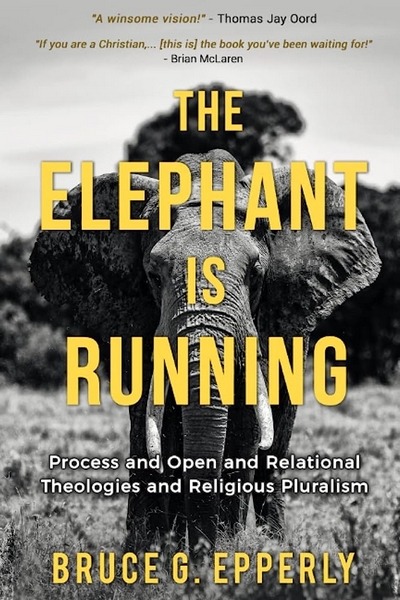The Elephant is Running
A Review
Frank A. Mills
August 18, 2022


The Elephant is Running: Process and Open Relational Theologies and Religious Pluralism, Bruce G. Epperly, 2022, Grasmere, Idaho, SacraSage Press, Paperback, ISBN: 978-1-948609-63-0, $19.99.
The Elephant is Running is not about elephants, it’s about creative transformation and evolving spirituality. It is a book for any Christian who is struggling with the narrow confines of traditional Christianity in an evolving world. The Elephant is Running is a book that I believe can open up new horizons for the Christian.
The Elephant is Running – a strange title – is not that strange if one substitutes the world, or even faith, for the elephant. The book takes its name from an ancient South Asian parable in which a group of sight-impaired individuals seek to describe via touch a living, moving elephant. Obviously, the description is going to be limited. Suppose that these same folk came back several times over the years to touch the elephant, their description would change would it not, as both they and the elephant have changed over the years.
“A living elephant is always in process and open to new possibilities of manifestations and experience and so, I believe,” Epperly writes, “is the living Divinity and our spiritual traditions.”
The sub-title is sure to scare some Christians. An accusation often made by Christians critical of both Process and Open Relational Theologies is that promotes religious pluralism. Religious pluralism, they claim, waters down Christianity, or even worse is the first step toward leaving Christianity behind. For some who have embraced religious pluralism this may be true, but it doesn’t have to be so.
According to Epperly, a Christian can embrace religious pluralism while remaining faithful to Christianity. In fact, In The Elephant is Running Epperly clearly demonstrates that the Christian can dialog with the wisdom of the world’s religions, and become a better Christian for it.
The problem I think is that we Christian often approach the world’s religions as either false or without an understanding of the essence of Christianity, or both. If we take the first approach, then we gain nothing. If we draw from other religions with understanding the essence of Christianity, we can indeed be lured away.
In The Elephant is Running, Epperly draws together what he considers to be the essence of Christianity, one that I doubt any Christian would take exception to. And it is through this “essence” that he dialogues with the wisdom of the world’s religions:
• God is love and God’s love is the motivating force of all creation, including human history.
• God, the origin of the moral and spiritual arc, is active in nature and history.
• History is the theatre of divine call and human response.
• God is speaking, and still speaking.
• Authentic Christian faith affirms its Jewish roots.
• The Word is made flesh in the Jesus of Nazareth.
• Divine wisdom is embodied in the physical world.
• Incarnation is global as well as local.
• God in Christ seeks the healing of all creation and every creature.
• Christian ethical aspiration is grounded in acts of love and hospitality.
• Based on God’s creative wisdom, both non-human creation and human history are meaningful.
• Salvation embraces mind, body, and spirit as God seeks to heal our lives in the here and now.
• Survival after death is the gift of divine love and embraces personality and community.
The list of religions that Epperly dialogs with is impressive, and I certainly came away from each section with a better understanding of what could be added to my faith. What is unique about Epperly’s dialog with each of the religions is that he also suggests what each religion could learn from Christianity. This is the root of real interfaith dialog, when we both are spiritually fed.
The elephant – our faith – should always be running. The world is not stopping. It is evolving and our Christian horizon needs to evolve with it. There is no place in an ever-evolving world for absolutes, especially religious absolutes, Epperly claims. Absolutes provide us only with a receding horizon, and in the case of religious absolutes, a static religion. We must realize that our grasp of the holy is always finite and subject to further growth. Growth that we can gain through dialogue with the world’s religions.

Bruce Epperly has served as a seminary professor and administrator, university chaplain, congregational pastor and is the author of over sixty books.
© Frank A. Mills, 1997-2024